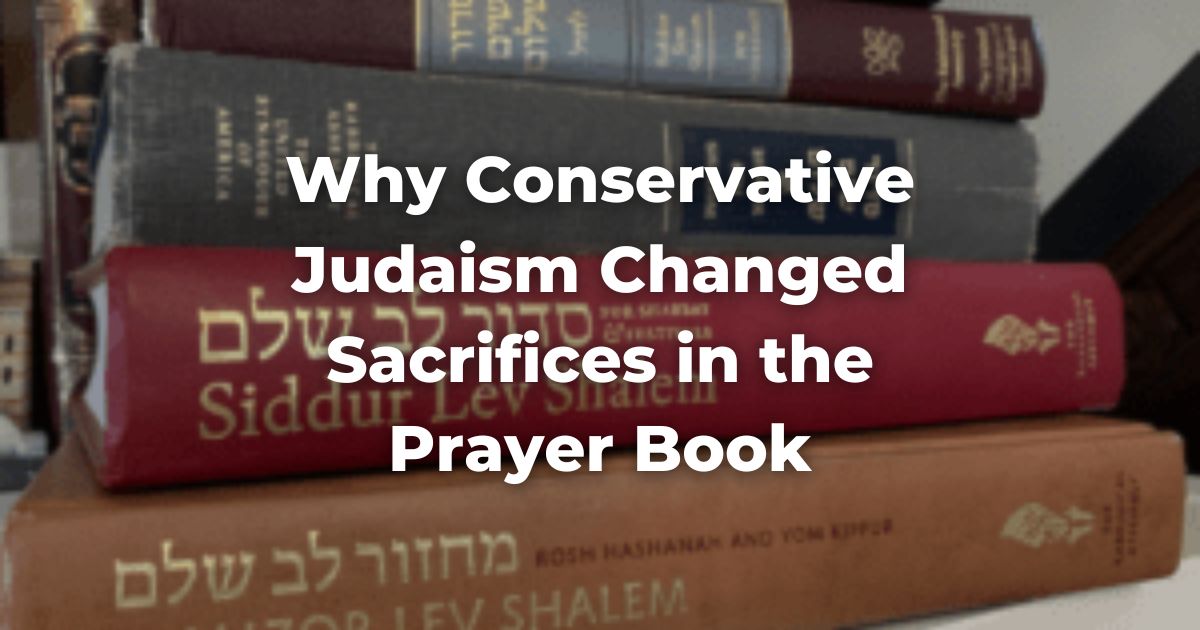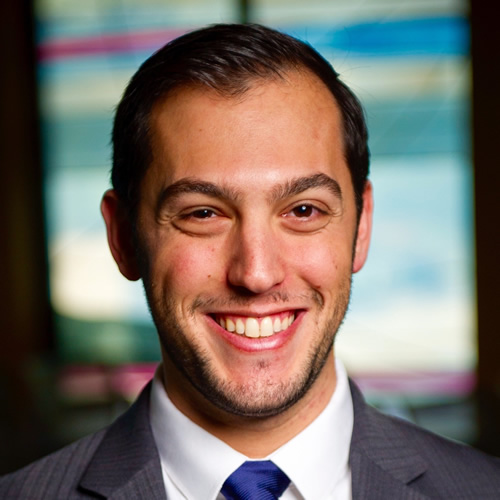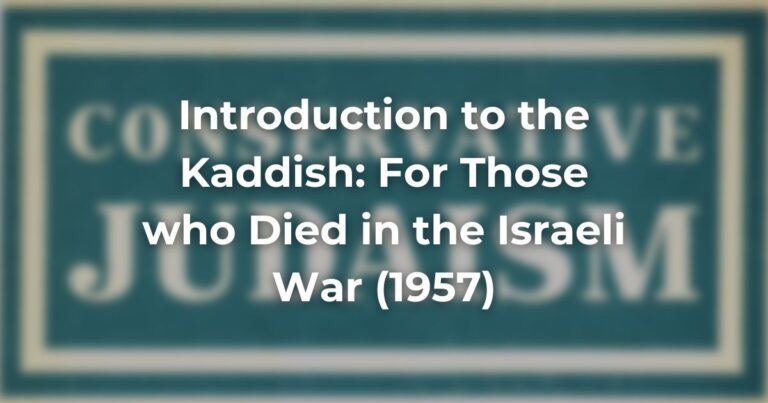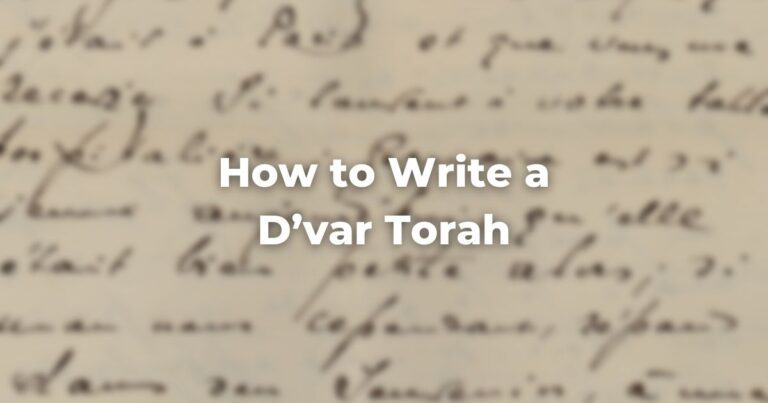One change made in 1927 by Conservative/Masorti Judaism in the siddur, prayer book, appears minor but has had significant theological implications.
Specifically, the editors of the Conservative/Masorti movement changed the way the sacrifices in the Temple were described from future to past tense.
All of Judaism’s prayer services are rooted in the ancient sacrifices given in the Temple. The Shacharit morning service corresponds to the morning sacrifices, the Mincha afternoon service corresponds to the afternoon offerings, and so on. You can read more about that here.
The Musaf service, added on Shabbat and holidays, is derived from the additional sacrifices on those days and, more specifically, outlines specific offerings given on that day.
Throughout Jewish history, as our prayers developed, the language used (and still used by many Jews) in that service says:
Lovingly, the additional Shabbat sacrifices will be offered there as You commanded.
וְאֶת מוּסַף יום הַשַּׁבָּת הַזֶּה נַעֲשה וְנַקְרִיב לְפָנֶיךָ בְּאַהֲבָה כְּמִצְוַת רְצונֶךָ …
Namely, that we describe the offerings in the future tense. A statement that we will make offerings and sacrifices again.
However, if you look at Conservative/Masorti siddurim, that is not what it says. It says this:
Lovingly, the additional Shabbat sacrifices were offered there as You commanded.
וְאֶת מוּסַף יום הַשַּׁבָּת הַזֶּה עָשׂוּ וְהִקְרִיבוּ לְפָנֶיךָ בְּאַהֲבָה כְּמִצְוַת רְצונֶךָ …
What does this mean?
While the rabbinic tradition imagined the rebuilding of the Temple and the return to sacrifices, it offers many new ways and frameworks for engaging in our relationship with God.
One way that the rabbis understood that relationship, in particular, was how we resolve sin. When we have done something wrong, let’s say with our relationship with God, the TorahRefers to the first five books of the Hebrew Bible, the Tanakh, also called the Five Books of Moses, Pentateuch or the Hebrew equivalent, Humash. This is also called the Written Torah. The term may also refer to teachings that expound on Jewish tradition. Read more tells us that there are offerings to be made. In the centuries since the destruction of the Temple, the rabbis have suggested that we no longer require sacrifices to play that role.
The idea expressed by Conservative/Masorti Judaism with this change is that the sacrifices reflect a ritual that was and should remain in the past. We honor them and are inspired by their symbolism, but recognize that returning to a sacrificial system is unnecessary.
To better reflect this viewpoint, the first change in a prayer book was in 1927 and has been retained in the century since then.
In 1985, the SiddurSim Shalom prayer book was published, Rabbi Jules Harlow, Rabbinical Assembly Director of Publications at that time, wrote this in the article, Introducing the Siddur Sim Shalom:
How do we gain ritual atonement for sin today, in a world without the Temple, which is the only site where the atoning ritual sacrifices may take place? …
[Drawing on a story about the Temple’s destruction in Avot D’Rabbi Natan 4:5] “Then Rabbi Yohanan ben Zakkai spoke to him these words of comfort: ‘Be not grieved, my son. There is another way of gaining ritual atonement, even though the Temple is destroyed. We must now gain ritual atonement for our sins through deeds of lovingkindness.’”
The sacrifices themselves are no longer the essential ritual; our behaviors toward one another are the most important thing. The choice to place sacrifices in the past tense and reorient our thinking is reflected in the choice to change the liturgy.
How did this come about?
In 1927, the United Synagogue of America, an early iteration of the Conservative Movement’s institutional framework, published the Festival Prayer Book. The Movement wanted to publish the festival machzorim (holiday-specific prayer books) together for ease of use rather than the traditional separate volumes, especially when including English.
There was an explicit intent to make useful choices about what piyyutim (liturgical poetry) to include, arrange the formatting for easy reading, and honor the generally accepted practices used in Europe at that time. In its introduction, it says:
It is one of the chief aims of the United Synagogue to endow the traditional Jewish service with all the beauty and dignity befitting it and inherent therein. With this end in view, especial [sic] care has been given, not only to the production of the correct text, but to such an arrangement of the text as will best express the prose or poetry of a liturgical composition.
Almost twenty years later, in the Fall of 1944, Rabbi Morris Silverman proposed a new prayer book, the Sabbath and Festival Prayer Book, which the Rabbinical Assembly and United Synagogue agreed to create.
In a presentation given by Rabbi Robert Gordis at the 45th Rabbinical Assembly Convention on July 27th, 1945, A Jewish Prayer Book for the Modern Age, he explained the decisions and philosophies that drove the decisions they made. This talk was subsequently published in the Conservative Judaism academic journal, where he wrote:
A step in the right direction was made in one edition of the United Synagogue Mahzor, which changed the phrases נעשה ונקריב [will be offered] from the future to the past עשו והקריבו [was offered]. It thus made ומפני הטאינו [a prayer in Musaf] express what untold numbers of modern Jews have found in it—a recollection of the ancient glory of Jerusalem and the Temple.
But prayer must be more than historical reminiscence.
Here, he affirms the decision made two decades before. It makes sense that we highlight that the sacrifices happened, using the past tense, while Musaf, on the whole, has “several other ideas and implications of value” that we should be careful to retain.
In response to trends toward removing Musaf entirely, he makes clear:
Animal sacrifices were a legitimate stage in the evolution of Judaism and religion generally. For all these reasons the deletion of the Musaf, no less than its retention unchanged, would violate the basic principles of a Jewish prayer book for the modern age.
Therefore, Gordis and the team editing the 1944 machzor affirmed the decision regarding the grammar and added further changes to align the sacrificial language fully in the past.
In 1985, when the Siddur Sim Shalom was published, as mentioned above, these changes were further extended with alternatives and replacements offered throughout the siddur.
In 1988, Rabbi Jeffrey Rubenstein wrote in his Conservative Judaism journal piece, Siddur Sim Shalom and Developing Conservative Theology:
We have shown that the de-emphasis of sacrifices is more extensive than the replacement of rabbinic passages concerning sacrifices with those emphasizing ethics. Sim Shalom goes beyond its predecessors in its efforts to minimize references to the cult, but its methods and message resemble those pioneered in both Sabbath and Weekday [the two previously published siddurim]. Yet a development in theology can be seen. Sacrifices in Sabbath were a necessary element of the musaf amidah as a testimony to the history of Jewish worship. In Weekday and Sim Shalom, mention of sacrifices is dispensable.
We have shown that the de-emphasis of sacrifices is more extensive than the replacement of rabbinic passages concerning sacrifices with those emphasizing ethics. It is also true that the emphasis on ethics goes beyond this replacement. … Thus Sim Shalom proclaims the importance of leading an ethical life from its outset.
As Conservative/Masorti theology evolved over the course of a century, the siddurim published by the movement reflected those changes. Reorienting from sin and the sacrificial system to a worldview rooted in ethics and interpersonal behavior.
These changes were further reflected in 2016 with the publication of the Siddur Lev Shalem prayer book series, the next iteration of the Movement’s prayer books.
Author
-

Rabbi Jeremy Markiz is a teacher and consultant. Based in the Washington, DC area, he teaches the Torah of personal growth, meaning and intentionality, and making the world a better place. He writes a newsletter called, With Torah and Love. Rabbi Markiz helps clergy, congregations, and Jewish organizations grow and communicate clearly in the digital world, develop effective strategies, and solve problems with his consulting firm, Next Level Rabbinics.
View all posts






